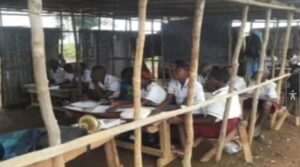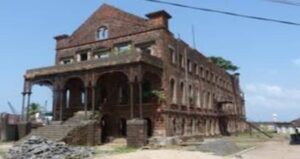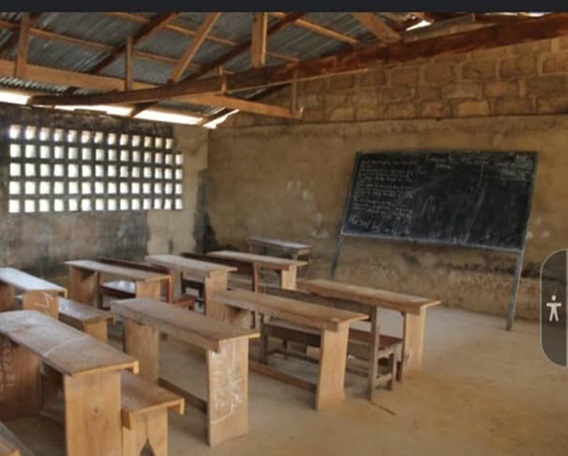By Sylvester Samai
Sierra Leone, located on the west coast of Africa, has a complex and polygonal education system shaped by its history, culture, and socio-economic challenges. From its early establishment as a hub for higher education in Africa to the devastating impact of the civil war and subsequent recovery efforts, Sierra Leone’s educational journey is one of resilience and ongoing transformation.
Although in 2018, the government launched the Free Quality School Education (FQSE) programme, a landmark initiative aimed at providing free education at the primary and secondary levels. The FQSE was to cover tuition fees, textbooks, teaching materials, and school supplies. The programme has led to a little increase in enrollment rates, particularly among girls. However, the implementation of FQSE has also highlighted the need for improved infrastructure, teacher training, and resource allocation to ensure that the quality of education is not compromised.
The roots of formal education in Sierra Leone can be traced back to the early 19th century when the British colonial administration established Western-style schools. One of the most significant milestones was the founding of Fourah Bay College in 1827 by the Church Missionary Society. As the first institution of higher learning in West Africa, Fourah Bay College played a pivotal role in educating generations of Africans, earning Freetown the moniker “Athens of West Africa.”
After gaining independence from Britain in 1961, Sierra Leone embarked on efforts to expand and reform its education system. The government prioritised education as a means of promoting national development and social cohesion. However, these efforts were hampered by political instability, economic challenges, and the outbreak of the civil war in 1991. The war, which lasted until 2002, had a catastrophic impact on the country’s infrastructure, including its schools, and disrupted the education of countless children.
The education system in Sierra Leone is structured into several levels, each with distinct characteristics and challenges.
Pre-primary education in Sierra Leone is intended for children aged 3-5. It is designed to provide early childhood education that prepares children for primary school. Despite its importance, access to pre-primary education remains limited, especially in rural areas. The lack of facilities, trained teachers, and awareness about the benefits of early childhood education are significant barriers.
Primary education, catering to children aged 6-11, is compulsory and lasts for six years. The government has made efforts to increase enrollment rates through initiatives like the Free Quality School Education (FQSE) programme. However, challenges such as overcrowded classrooms, inadequate learning materials, and high dropout rates persist. Many children, particularly girls, face obstacles that prevent them from completing their primary education, including economic hardships, cultural practices, and gender-based violence.
Junior secondary education covers three years and serves as a bridge between primary and senior secondary education. Students at this level are typically aged 12-14. The transition from primary to junior secondary school is often marked by a significant drop in enrollment, partly due to the examination system that filters students based on their academic performance. The quality of education at this level is hindered by a shortage of qualified teachers and insufficient resources.
Senior secondary education spans three years and prepares students for tertiary education or vocational training. Students at this level face rigorous academic demands, and their performance in national examinations determines their eligibility for higher education. The pressure to succeed in these examinations often exacerbates existing inequalities, as students from affluent families can afford private tutoring and better educational resources.

Sierra Leone boasts several institutions of higher learning, including universities, colleges, and technical/vocational schools. The University of Sierra Leone, which includes Fourah Bay College, Institute of Public Administration and Management, and College of Medicine and Health Sciences, remains the premier provider of tertiary education in the country. Despite their historical significance, these institutions face numerous challenges, including inadequate funding, outdated curricula, and limited research capacity.
The education system in Sierra Leone is beset by a myriad of challenges that hinder its effectiveness and equity.
Malpractice in Sierra Leone’s education system is a significant issue that affects the quality and integrity of education. Various forms of malpractice, such as examination fraud, teacher absenteeism, and corruption, undermine the educational development of students.
Cheating during exams is prevalent. Students, sometimes with the assistance of teachers, paid exam takers, or school administrators engage in various forms of fraud to pass exams. This practice devalues the education system and compromises the meritocracy intended by examinations.
Many teachers frequently miss classes, leaving students without instruction for extended periods. This absenteeism is often due to poor pay, inadequate working conditions, and the need for teachers to take on secondary jobs to support themselves.
Corruption is another pervasive problem, with instances of bribery and favoritism affecting the hiring and promotion of teachers, as well as student admissions. These corrupt practices create an unequal playing field and hinder access to quality education for all students.

Schools in Sierra Leone often lack basic resources, including textbooks, teaching materials, and adequate facilities. This scarcity leads to substandard education and contributes to malpractice as teachers and students struggle to cope with the deficiencies.
The education system suffers from weak oversight and regulatory enforcement. Policies intended to curb malpractice are often poorly implemented, and there is limited accountability for those who engage in unethical practices.
One of the most pressing issues is the lack of adequate infrastructure and resources. Many schools operate in dilapidated buildings or temporary structures that lack basic amenities such as electricity, clean water, and sanitation facilities. In rural areas, students often study under trees or in makeshift shelters. The scarcity of textbooks, desks, and teaching aids further worsen the problem, making it difficult for students to engage in meaningful learning.
The quality of education in Sierra Leone is compromised by several factors. The shortage of trained and qualified teachers is a significant concern. Many teachers lack formal training and professional development opportunities, leading to ineffective teaching methods and poor student outcomes. Additionally, the curricula are often outdated and do not align with the needs of the labour market or the demands of a rapidly changing world.
Gender disparities remain a critical issue in Sierra Leone’s education system. Although efforts have been made to promote gender equality, girls continue to face significant barriers to education. Early marriage, teenage pregnancy, and cultural norms that prioritise boys’ education over girls’ are prevalent in many communities. As a result, girls are more likely to drop out of school, especially at the secondary level. Addressing these disparities requires targeted interventions and community engagement to change attitudes and practices that disadvantage girls.
Economic barriers are a major impediment to education in Sierra Leone. Despite the government’s efforts to provide free education, families still bear the costs of uniforms, books, examination fees, and other expenses. For many low-income families, these costs are prohibitive, leading to high dropout rates. Additionally, children from impoverished backgrounds often have to work to support their families, limiting their ability to attend school regularly.
The legacy of the civil war continues to affect the education system in Sierra Leone. The war destroyed schools, displaced families, and traumatised many children. Although significant progress has been made in rebuilding the education sector, the long-term psychosocial impacts of the war still linger. Many children who grew up during the conflict missed out on years of schooling and now face challenges in accessing education and employment opportunities.
Recognising the critical role of education in national development, the government of Sierra Leone should implement several initiatives and reforms to address the challenges facing the education system.
The government, with support from international partners, should continue to implement a school feeding programme to improve student attendance and performance. The programme provides meals to students, particularly in rural and underserved areas. By addressing the issue of hunger, the school feeding programme should aim to create a conducive learning environment and reduce dropout rates.
To enhance the quality of education, the government should prioritise teacher training and professional development. Various initiatives should be launched to provide pre-service and in-service training for teachers, focusing on modern teaching methodologies, classroom management, and subject-specific knowledge. These efforts will equip teachers with the skills and knowledge needed to deliver effective and engaging lessons.
Recognising the need for a relevant and up-to-date curriculum, the government should embark on curriculum reform initiatives for both primary and high schools. The goal is to align the curriculum with national development priorities, global trends, and the needs of the labour market. Emphasis is being placed on STEM (Science, Technology, Engineering, and Mathematics) education, technical and vocational training, and life skills education. These reforms will prepare students for the demands of the 21st-century economy and to foster critical thinking, creativity, and problem-solving skills.
Inclusive education is a key priority for the government of Sierra Leone. A little effort is being made to ensure that children with disabilities have access to quality education. This includes the provision of specialised training for teachers, the adaptation of curricula and teaching materials, and the development of inclusive policies and practices. By promoting inclusive education, the government can create an education system that is equitable and accessible to all children, regardless of their abilities or circumstances.
Sierra Leone has received substantial support from the international community in its efforts to improve the education system. Various international organisations, bilateral donors, and non-governmental organisations (NGOs) are actively involved in supporting education initiatives in the country.
The United Nations Children’s Fund (UNICEF) has been a key partner in supporting education in Sierra Leone. UNICEF’s programmes focus on improving school infrastructure, providing learning materials, supporting teacher training, and promoting gender equality in education. The organisation also works on initiatives to enhance early childhood education and to ensure that children affected by emergencies, such as natural disasters and epidemics, have access to education.
The World Bank has been instrumental in funding projects aimed at enhancing educational access and quality in Sierra Leone. Through various grants and loans, the World Bank supports infrastructure development, teacher training, and curriculum reform. The organisation also collaborates with the government to implement data-driven policies and strategies to improve the education system.
Numerous NGOs are actively involved in education initiatives in Sierra Leone. Organisations such as Plan International, Save the Children, and Education for All Sierra Leone focus on different aspects of education, from building schools and providing scholarships to advocating for policy reforms and promoting community engagement. These NGOs play a crucial role in addressing the gaps and challenges in the education system and in supporting the government’s efforts to achieve its educational goals.
With all the challenges, Sierra Leone needs to make significant progress in improving its education system. The implementation of the FQSE programme has led to a little increase of enrollment rates, particularly among girls.
Education in Sierra Leone is at a critical juncture. While there have been some strides, substantial challenges remain. Addressing these requires a concerted effort from the government, international community, and local stakeholders to ensure that every child in Sierra Leone has access to quality education and the opportunity to thrive. The Free Quality Education shouldn’t just be on the lips of people but it should be visible in all schools.
If this is done, Sierra Leone will gain its former glory as the Athens of West Africa.


